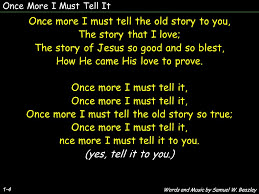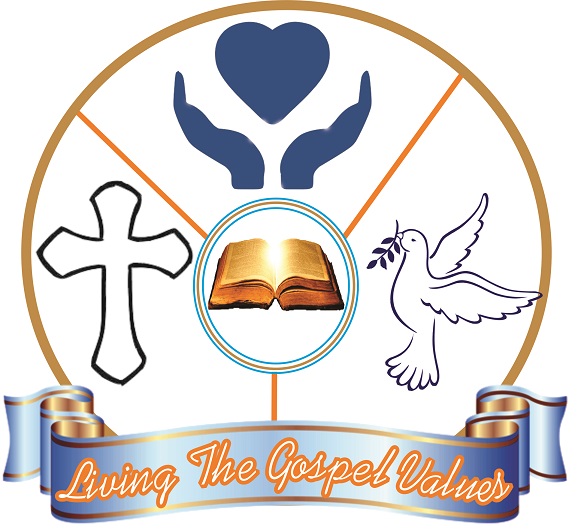The Story We Must Tell
Living the Gospel Value
October 23, 2021
Reflection on Today's Readings, 30th Sunday in Ordinary Time, Year B, October 24th, 2021
Texts: Jer. 31:7-9; Ps. 126:1-6; Hebrews 5 : 1-6; Mark 10:46-52
Today is mission Sunday and the theme for this year mission Sunday is, "I cannot but tell what I have seen and heard" (Acts 4:20). Those were the words of apostles Peter and John before the council when they were arrested for preaching that there was resurrection in Jesus Christ (Acts 4:2). Those words of theirs expressed their conviction and experience of God's wonder, wonder that overcome their imagination, wonder that touched them and transformed them. The mood of the apostles is expressed beautifully in today's psalm: "When the Lord brought back the exiles of Sion, we thought we were dreaming. Then was our mouth filled with laughter; on our tongues, songs of joy. Then the nations themselves said, 'What great deeds the Lord worked for them!' What great deeds the Lord worked for us! Indeed, we were glad." When life is touched, when God surprises us, the mouth cannot but say something. The experience of love transforms difficulty into blessing. In this year Pope's message for mission Sunday, he says, "Yet, rather than a difficulty or an obstacle leading them to step back or close in on themselves, those experiences impelled them to turn problems, conflicts and difficulties into opportunities for mission. Limitations and obstacles became a privileged occasion for anointing everything and everyone with the Spirit of the Lord. Nothing and no one was to be excluded from the message of liberation."
Resurrection was an uncommon and unbelievable reality in the time of the apostles. It was a story that could only be communicated by a madman. The apostles experienced in resurrection the love of God and redemption of human race. Their story is the story of love and redemption of human race. It is also a story of the redemption of creation. The apostles could not but tell the story of love and redemption, the story of the One who resurrected. It was a story of a God who became man and conquered death by dieing. He died to conquer death.
The story was not entirely the story of God but also their story, for it was what they saw and heard. It was the story of how man encountered God and transformed him. It was the story of how God came to meet man in his space and time. It was the story of how the story of man mingle with that of God. About the journey to Emmaus, it is said, "While they were talking and discussing, Jesus himself came near and went with them, but they were prevented from recognising him" (Luke 24:15-16). In the journey Jesus joined them and gradually opened their eyes that they could say, "what we have seen and heard." About the apostles, it is said, "When it was evening on that day, the first day of the week, and the doors of the house where the disciples had met were locked for the fear of the Jews, Jesus came and stood among them and said, 'Peace be with you'. We see in those words the fear of the apostles and how Jesus Christ gave them peace. In today's gospel reading, we see how Bartimaus met Jesus Christ who gave him more than what he asked for. He asked for sight but Jesus gave him wellness, wholeness, not just sight. It is said, "And the blind man said to him, 'Master, let me receive my sight.' And Jesus said to him, 'Go your way; your faith has made you well.' And immediately he received his sight and followed him on the way." The story is the story of Bartimaus, the story of how his life was transformed and how he became disciple to Jesus Christ.
The gospel we proclaim is both our story and that of God. Today we only proclaim half of the story, the story of God. We do not longer proclaim our own story because our lives remain the same or even worse than before. The story shines in splendour when it is mingled with the life story of the believers. The message makes sense when it is evident in the life of the believers. Hence, St. Paul tells Titus thus: "Likewise, tell the older women to be reverent in behaviour, not to be slanderers or slaves to drink; they are to teach what is good, so that they will encourage the young women to love their husbands, to love their children, to be self-controlled, chaste, good managers of the household, kind, be submissive to their husbands, so that the word of God may not be discredited" (2:3-5) The point, here, is that our lives should be witnesses to the message to prevent it from being disregarded.
Our encounter with Jesus Christ should inspire in us sense of mission and vocation. It is said of Bartimaus thus: "And immediately he received his sight and followed him on the way." In the first reading, Jeremiah says, "Thus says the Lord: 'Sing aloud with gladness for Jacob, and raise shouts for the chief of the nations; proclaim, give praise, and say, ‘The Lord has saved his people, the remnant of Israel.’" The evidence that we have encountered Jesus is the life lived after Him. We are to follow the footsteps of Jesus Christ.
We participate in the mission of Christ by going into the mission and by giving for the mission. Today people are asked to give for the mission. When we give for the mission we make the work easy for those who are into it. Priests, the religious and consecrated life have given themselves for the mission; they dedicated their life to proclaim the gospel. It is our duty as laity to support the work of mission they have undertaken.
Almighty ever-living God, increase our faith, hope and charity, and make us love what you command, so that we may merit what you promise. Amen.
Fr. Andrew Olowomuke
- July 20251
- January 20253
- December 20242
- November 20245
- October 20244
- September 20242
- August 20245
- July 20247
- June 20247
- May 202413
- April 202420
- March 202422
- February 202428
- January 202434
- December 202333
- November 202330
- October 202333
- September 202329
- August 202331
- July 202331
- June 202315
- October 20221
- September 20228
- August 20221
- July 20221
- June 202218
- May 202230
- April 202230
- March 202210
- February 20229
- January 202228
- December 202133
- November 202130
- October 202130
- September 202115
- August 202128
- July 202131
- June 202128
- May 202133
- April 202128
- March 202130
- February 202131
- January 202131
- December 202032
- November 202032
- October 202034
- September 202028
- August 202031
- July 202031
- June 202026
Wikipedia
Search results
Contact Form
Popular Posts

The Sainthood
November 01, 2020

Conversion: Our way of Life
January 24, 2022

Be Unassuming
November 03, 2023
AD BANNER






0 Comments